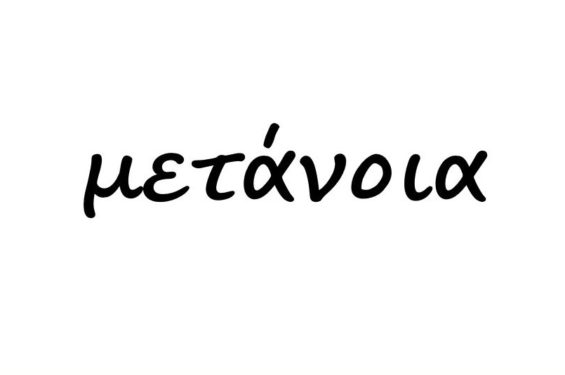
Unless we’ve been living under a rock, we all know that Lent is a time when people frequently talk about something called repentance. And if you’re anything like me, you grew up hearing the word repentance and equating it with images of self-flagellation, excessive prayer, maybe attending confession, and probably doing a lot of penance in the hopes that forgiveness would eventually find its way to us. But that’s not exactly what repentance means. At least not biblically. First of all, God’s forgiveness comes through grace. We can’t earn it and we don’t really deserve it. He gives it freely. And when Jesus tells us to repent, he uses the Greek word metanoia. Metanoia doesn’t mean any of those things at all! Instead, metanoia means a change of heart, a change of mind, or a change of course. In other words, when we think of repentance in a theological context, it means we examine the individual pieces of our lives and then make corrections accordingly. What a great practice not just during Lent, but always!

Lent can indeed be a good time to practice metanoia. And, like any athlete knows, solid efforts during practice help us in all facets of our lives. A golfer who hits 100 range balls every day is going to have a more consistent swing and will probably hit fewer errant shots than one who never practices. This is true even if that golfer takes a couple weeks off from practicing, because our bodies create muscle memory. That’s why we use the expression, “it’s like riding a bike!” Once you know how to do it, even if you haven’t done it in a while, you’re still able to put your muscle memory to work and you can keep yourself balanced on only two wheels. I think that’s pretty impressive!
So if we want to practice repentance, or, metanoia, then what is it that we are correcting? Perhaps many things and perhaps only a few. We get to do something that is often referred to as an examination of conscious. Our Jesuit brothers offer us some helpful tips by sharing with us the Ignatian prayer practice called the Examen. To pray the Examen, we try our best to see God in all things. We are encouraged to place ourselves in God’s presence, to give thanks to God for his love for us, to pray for the grace to understand God’s work in our lives, to review or recall our day (focusing on specific moments that stand out), to reflect on what we did or said in those instances and to ask ourselves about our motives, and to look toward tomorrow. How might we use what we learned in doing some metanoia and correcting course in those times we didn’t hit the mark?
We can do these kinds of reflections on our own and we can do them as a community. There needn’t be any unnecessary shame. It isn’t helpful for us to beat ourselves up. We simply need to be honest with ourselves, acknowledge that something could go better if we respond differently next time, and then make the appropriate changes if or when we ever get the opportunity again. But no getting down on ourselves for getting it wrong! That doesn’t help anyone, and it can lead us into that other, incorrect interpretation of repentance. Instead of saying, “I shouldn’t have said that! I’m such an idiot!”, we might say, “I said something that was unkind. If I have the chance, I will apologize to the person I offended. And then, if I’m ever in a similar situation, I will be mindful about saying something kind instead.” Notice how the first option forces us into a place of shame, but the second option helps us move into a place of growth? That’s what we’re doing when we practice metanoia.
As a Church, I would like all Christians to practice metanoia as we try to heal the hurts caused to others in our lives. Sadly, the Church hurts people. We’d like to think of the Church as a place where there’s only love and kindness. But even the healthiest parish communities commit sin (we’ll explore sin together soon). This might look like a parishioner taking ministry tasks a little too seriously and becoming snippy when someone else tries to help. It might mean a priest is exhausted from a busy first week of Lent and that priest says something unkind to a parishioner in need. It might mean someone is treated poorly because of something like age, race, gender, or sexual orientation. In all these types of incidents, we must practice metanoia. Lent is a wonderful time to learn to practice.
Do we notice a visitor who looks lonely? Then perhaps maybe we can sit with that person during the service, or during coffee hour. Better yet, we can invite that person to join our friend group! Is a young person interested in learning about a ministry team or trying to help us out? Then we can encourage that young person’s enthusiasm by inviting them to help, even if their inexperience means our tasks might take a little longer than they would have otherwise. Are we running out of cupcakes, and we notice someone hasn’t yet had a chance to try one? Then maybe we can offer ours to that person, or maybe we can offer to cut ours in half and then share. Did we hurt someone’s feelings because we were focused on something else, and maybe we weren’t aware of it in the moment? Then maybe we can find that person and make a sincere apology. There are a lot of ways people are hurt in the Church. Often, it isn’t intentional. But that doesn’t mean it doesn’t hurt. The Church is constructed of people, and people are imperfect. We’re flawed. We miss the mark. We don’t always get it right. But when we recognize that we didn’t get something right, we participate in metanoia. We change our heart.
As a community, I invite us during this holy season of Lent, to make efforts to do thoughtful and prayerful examinations of conscious. If the Examine is helpful, then we can use that tool. If something else is more effective, then, by all means, use something else. As we recognize the errors in our ways, then let’s participate in metanoia. Although the Church certainly has caused (and sadly will continue to cause) injury and hurt, the Church can also be a place of tremendous healing and metanoia. During this season of Lent, I encourage all of us to heal the hurts of a cruel world. Let’s make the Church a place full of love and joy. When we recognize places where those two pieces are absent, then let’s practice true repentance, true metanoia.
